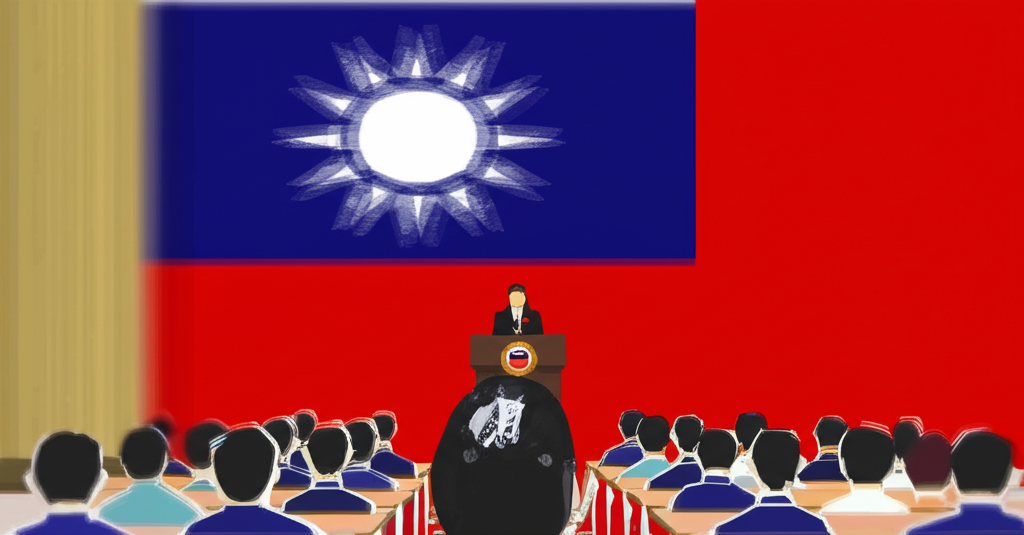Taiwan's President Vows to Protect Democracy, Rejecting Calls for Elimination
Lai Ching-te Addresses Freedom of Speech and National Security in the Face of Growing CCP Threats

New Taipei, April 7 - President Lai Ching-te (賴清德) emphasized that the absolute freedom of speech does not extend to advocating for the elimination of Taiwan. He made these remarks on Monday at a memorial event commemorating Nylong Cheng (鄭南榕), a pioneer of the pro-democracy movement, on the 36th anniversary of his death.
Lai highlighted the multifaceted threats facing Taiwan, including psychological warfare, media manipulation, and legal actions orchestrated by the Chinese Communist Party (CCP). He also noted the increase in "gray zone" activities aimed at destabilizing the nation. The President stated that in the past year alone, 64 Taiwanese were prosecuted for spying for the CCP, a fourfold increase compared to 2021.
"These people, funded by (Chinese) communists, acted in collaboration with China in an attempt to threaten Taiwan's democratic and free constitutional institutions," Lai stated.
Lai also addressed the recent large-scale military exercises conducted by China near Taiwan, involving its air and naval forces, which were perceived as attempts to pressure Taiwanese citizens into abandoning their homeland, freedom, and democracy.
In response to these challenges, Lai affirmed the government's commitment to taking decisive action against individuals colluding with China to advocate for a military invasion of Taiwan or employ "extreme" measures to undermine democratic institutions. The government will also act against those seeking to "threaten national security and exploit freedom and diversity in Taiwan to create chaos."
"As president, my mission is to sustain the survival and development of this country, safeguard hard-won democracy and freedom, and ensure that this country's sovereignty will not be absorbed or encroached upon," he declared.
Lai further clarified that "any initiative propagating the exploitation of the Taiwanese people's freedoms or the elimination of the Republic of China, Taiwan, is unacceptable to Taiwanese society, and absolute freedom of speech does not mean using freedom to destroy freedom."
Yeh Chu-lan (front, left), Nylong Cheng's widow, was also present at the memorial service in New Taipei.
Cheng, a staunch advocate for Taiwan's independence and freedom of speech, self-immolated on April 7, 1989, to avoid arrest by the then-Kuomintang administration, which charged him with sedition. In 2016, the Taiwanese government declared April 7 Freedom of Speech Day.
The issue of freedom of speech has been a topic of public discussion in recent weeks, particularly following the revocation of residence permits of three Chinese influencers married to Taiwanese husbands for advocating the military takeover of Taiwan by China.
The government based its decision on the Act Governing Relations between the People of the Taiwan Area and the Mainland Area, which allows for the deportation of Chinese nationals deemed a threat to national or social stability.
► Historical documents, diary mark 36th anniversary of Nylon Cheng's death
► Chinese spouse loses final appeal against deportation order
► 75 scholars criticize Lai's populism, freedom of speech erosion
Other Versions
La Presidenta de Taiwan'promete proteger la democracia y rechaza los llamamientos a eliminarla
La présidente de Taïwan s'engage à protéger la démocratie et rejette les appels à l'éliminer
Presiden Taiwan Bersumpah untuk Melindungi Demokrasi, Menolak Seruan untuk Menghilangkannya
Il presidente di Taiwan promette di proteggere la democrazia, respingendo gli appelli all'eliminazione
台湾総統、民主主義を守ると宣言 排除を求める声は拒否
대만 대통령, 민주주의 수호 다짐하며 제거 요구 거부
Nangako ang Pangulo ng Taiwan na Poprotektahan ang Demokrasya, Tinatanggihan ang Panawagan para sa Pagwawakas
Президент Тайваня обещает защищать демократию, отвергая призывы к ее ликвидации
ประธานาธิบดีไต้หวันให้คำมั่นสัญญาว่าจะปกป้องประชาธิปไตย ปฏิเสธข้อเรียกร้องให้ยกเลิก
Tổng thống Đài Loan cam kết bảo vệ dân chủ, bác bỏ lời kêu gọi xóa bỏ

